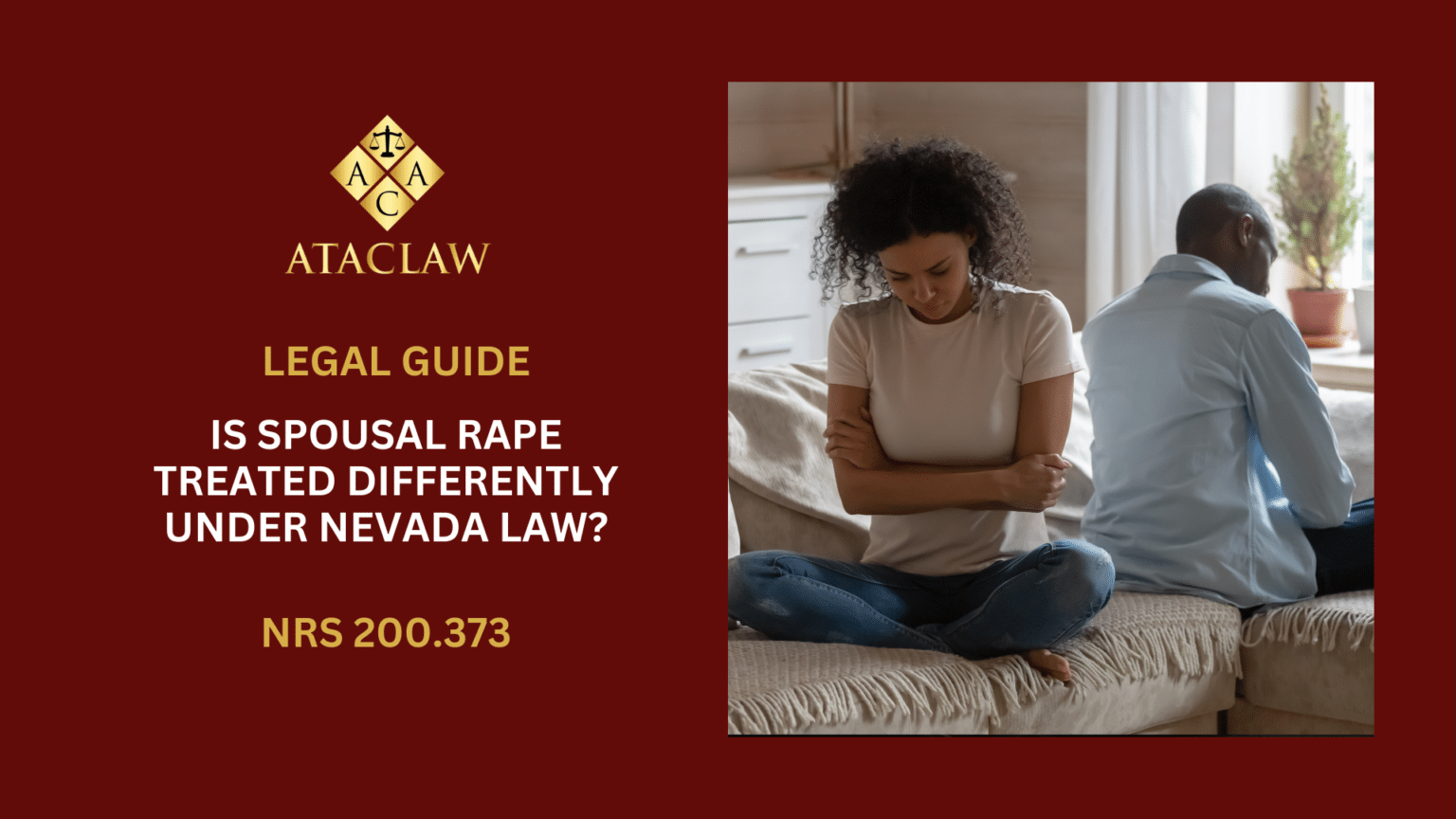In Nevada, the law draws a clear line: spousal rape (also known as marital rape) is legally recognized and carries penalties akin to those for rape of a non-spouse. This acknowledgment in the legal framework underscores the seriousness with which Nevada treats all forms of rape. Specifically, individuals convicted under this statute may face as severe a sentence as life imprisonment, with the chance of parole depending on the circumstances of their case. Today, we’re exploring a particularly sensitive and critical topic: spousal rape, as defined under NRS 200.373. Understanding the nuances of this law is crucial for both legal professionals and the public.
How Is Spousal Rape Defined and Prosecuted in Nevada?
In the state of Nevada, the law explicitly recognizes the crime of spousal rape, highlighting the seriousness with which this offense is treated. Unlike some jurisdictions where legal ambiguities can sometimes exist, Nevada’s legal framework is clear: sexual assault within marriage is illegal and subject to severe penalties. This holds true irrespective of the marital status or living situation at the time of the offense, and regardless of how much time has passed between the incident and its reporting to law enforcement.
The legal considerations for spousal rape in Nevada align closely with those for sexual assault involving individuals who are not married. However, there is a notable distinction when it comes to the topic of consent.
The Critical Role of Consent in Sexual Assault vs. Spousal Rape Cases
When it comes to relationships outside of marriage, any sexual activity without clear consent—particularly when the individual is unable to knowingly give their consent due to incapacitation—is unequivocally categorized as rape. This remains the case even in the absence of physical force or intimidation.
Conversely, under Nevada Revised Statutes (NRS) 200.373, the law suggests a nuanced view regarding consent within marriage. Technically, it may appear that sexual activity without explicit consent may not always constitute spousal rape unless force or the threat of force is present. Instances where a spouse is asleep, unconscious, or significantly intoxicated could, hypothetically, fall into a legal gray area.
However, it’s critical to understand that the absence of clear consent can still lead to criminal charges, with the final determination possibly resting with a jury. This underscores the utmost importance of seeking and obtaining explicit consent in all sexual encounters, including within marriage.
How Can You Effectively Defend Against Charges Under NRS 200.373 in Nevada?
In the realm of Nevada law, accusations related to spousal or marital rape, codified under NRS 200.373, are a serious matter that can upend lives and fracture families. Unfortunately, amidst the emotional turmoil of domestic disputes, allegations of this nature can sometimes emerge, not always rooted in truth but in the heat of anger, jealousy, or strategic maneuvering during divorce or custody battles. For those facing charges in Las Vegas and beyond, understanding your defense options is crucial. Here are several strategies to consider when contesting these charges:
1. Establishing the Context of Marriage as a Defense
Nevada law nuancedly navigates the context of marriage in cases of alleged spousal rape. While marriage itself is not an absolute shield, its dynamics can influence the case’s trajectory, especially if there’s no evidence of coercion, force, or threats. Demonstrating that any accusations of forced sexual conduct are unsupported by evidence of battery or intimidation could lead to a dismissal of charges. The law scrutinizes the nature of consent within the marriage, distinguishing forceful acts from consensual marital relations.
2. Proving the Non-Occurrence of the Alleged Incident
A foundational aspect of contesting a spousal rape charge involves challenging the occurrence of the alleged sexual act. Due to the private nature of such cases, tangible evidence may not always be readily available. If the prosecution fails to conclusively prove that a sexual interaction took place under the circumstances described, the defense can push for the case to be dropped. This approach rests on the principle that without unequivocal evidence of the act and its non-consensual nature, a conviction should not stand.
3. Counteracting False Accusations
It’s an uncomfortable reality that false allegations of spousal rape can emerge in the heat of matrimonial disputes. Motivations may vary, from emotional retaliation to strategic moves in ongoing divorce or custody proceedings. Building a defense that highlights the absence of force or coercion — especially when these claims are aimed at gaining leverage in another legal arena — is key. Demonstrating that the accusation lacks merit or is motivated by factors unrelated to the truth can significantly impact the outcome.
What Are the Legal Consequences of Spousal Rape in Nevada?
In Nevada, spousal rape holds severe legal ramifications, reflective of its classification as a Category A felony, the highest severity level for crimes in the state. This starkly underscores the gravity with which the law views such offenses within a marital context. Depending on the specifics of the case, particularly regarding the extent of harm to the victim, the consequences vary significantly but remain invariably serious.
Penalties Involving Substantial Bodily Harm
When an instance of spousal rape results in substantial bodily harm to the victim, the convicted individual faces extremely harsh penalties. The law stipulates imprisonment for life, a sentence that may or may not include the option of parole. If parole is a possibility, it becomes available only after a minimum incarceration period of 15 years. This reflects the heightened severity attributed to crimes causing significant physical injury.
Penalties without Substantial Bodily Harm
In circumstances where the spousal rape does not lead to substantial bodily harm, the penalties, while slightly less severe, still involve considerable imprisonment. The convicted party can be sentenced to life imprisonment with eligibility for parole after serving a minimum of 10 years. This adjustment denotes the law’s flexibility in response to the degree of harm incurred by the victim.
Mandatory Sex Offender Registration
A conviction for rape in Nevada mandates registration as a Tier III sex offender for life. This designation carries profound implications for an individual’s personal and professional life, underscoring the enduring stigma and restrictions imposed upon those convicted of such crimes. The seriousness with which Nevada treats sexual offenses is further emphasized by the requirement of lifetime supervision under specific conditions, although there exists the potential for relief from this supervision after a decade.
Possibilities through Plea Bargains
In situations where the state’s prosecutor opts not to dismiss the spousal rape charge, and the accused prefers to avoid trial uncertainty, plea bargains may offer an alternative route. The state might agree to reduce the charges to battery domestic violence (BDV), a felony that, while serious, results in a significantly more lenient prison sentence compared to sexual assault and negates the requirement for sex offender registration. This option provides a prosecutorial outlet that, under certain circumstances, might serve both judicial efficiency and the interests of the accused.
Due to the complex nature and significant repercussions involved in Nevada spousal rape cases, it is essential to secure proficient legal counsel. A well-versed defense attorney, such as those at ATAC LAW, can adeptly manage the intricacies of plea negotiations, advocate for optimum outcomes, and furnish guidance through the intimidating terrain of criminal legal proceedings for sexual offenses.
For further legal assistance and to discuss your case with an expert, don’t hesitate to contact ATAC LAW.




